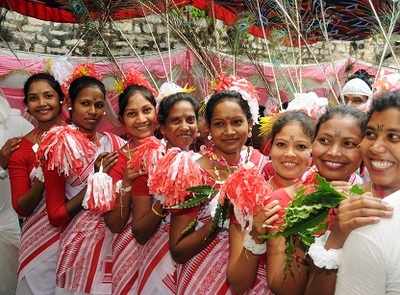- News
- entertainment
- events
- ranchi
- Ranchi revels in good Karma
Trending
This story is from September 23, 2018
Ranchi revels in good Karma
It was a time for dance, music and festivities at cultural events organised at several locations across the city

Tribal culture and history form a huge part of the identity of Jharkhand as a state and the festival of Karma is part of a legacy that has been passed down from one generation to another. Popular as a celebration of nature and it’s bounties, Ranchi saw colourful rituals, dance and songs on nature as the tribal community celebrated Karma this week.
It was a time for dance, music and festivities at cultural events organised at several locations across the city.The festival, which dates back several centuries, was celebrated with great pomp and splendour by Ranchiites, complete with the catchy beats of the mandar and nagada accompanying the songs from tribal communities of
the state.
TN Sahu, the head of the Tribal Regional Language Department at Ranchi University, said, “Karma is celebrated to acknowledge the role of nature as a guardian for the human race. Young girls from the tribal communities observe a fast throughout the day to pray to Karam Devta for the well-being of their brothers. Men participate in the festivities to express a sense of brotherhood with nature.”
Explaining the history of the Karma festival, Snehal Prapt, a student from the TRL department, said, “The festival of Karma helps us reestablish our close links and dependence on nature. As per our folklore, Karam Devta is said to be the lord of youth and power and we worship him during the festival for a good harvest in the year ahead. Tradition has it that celebrating Karma helps our farmlands regain their fertility and give us an even better produce the next year.”
The festival has its own customs and traditions that have remained just the same over centuries. On the day of the festival, the devotees observe a fast and offer their prayers to leaves or branches of karam and sal trees. While exchange of jaba, or hibiscus flowers, is used as a token to seal an everlasting bond of friendship, young girls pray for the well-being of their brothers.
Another interesting tradition is the consumption of hadiya, or home-made rice beer. Hadiya is considered to have physical and mental benefits, instead of just being an intoxicating drink. The traditional belief has it that it helps people get re-energised to celebrate the glory of nature.
“Earlier, Karma was a festival celebrated only in tribal homes. But Dr Ram Dayal Munda, the former VC of Ranchi University, wanted the world to know about the nature conservation practices of tribal communities. The celebrations started at schools, colleges and many social setups have made this festival more inclusive,” added Sahu.
It was a time for dance, music and festivities at cultural events organised at several locations across the city.The festival, which dates back several centuries, was celebrated with great pomp and splendour by Ranchiites, complete with the catchy beats of the mandar and nagada accompanying the songs from tribal communities of
the state.
TN Sahu, the head of the Tribal Regional Language Department at Ranchi University, said, “Karma is celebrated to acknowledge the role of nature as a guardian for the human race. Young girls from the tribal communities observe a fast throughout the day to pray to Karam Devta for the well-being of their brothers. Men participate in the festivities to express a sense of brotherhood with nature.”
Kiran Kerketta, a student from the city, said, “Karma is a festival of joy and brotherhood. We pay our respect to the earth and pray to her to bless us with fertile land, clean water and a good year for crops ahead. Karma has a very ancient history and since I have returned to Ranchi after two years in a different city, it was definitely a great opportunity for me to interact with people and learn about my own culture.”
Explaining the history of the Karma festival, Snehal Prapt, a student from the TRL department, said, “The festival of Karma helps us reestablish our close links and dependence on nature. As per our folklore, Karam Devta is said to be the lord of youth and power and we worship him during the festival for a good harvest in the year ahead. Tradition has it that celebrating Karma helps our farmlands regain their fertility and give us an even better produce the next year.”
The festival has its own customs and traditions that have remained just the same over centuries. On the day of the festival, the devotees observe a fast and offer their prayers to leaves or branches of karam and sal trees. While exchange of jaba, or hibiscus flowers, is used as a token to seal an everlasting bond of friendship, young girls pray for the well-being of their brothers.
Another interesting tradition is the consumption of hadiya, or home-made rice beer. Hadiya is considered to have physical and mental benefits, instead of just being an intoxicating drink. The traditional belief has it that it helps people get re-energised to celebrate the glory of nature.
“Earlier, Karma was a festival celebrated only in tribal homes. But Dr Ram Dayal Munda, the former VC of Ranchi University, wanted the world to know about the nature conservation practices of tribal communities. The celebrations started at schools, colleges and many social setups have made this festival more inclusive,” added Sahu.
End of Article
FOLLOW US ON SOCIAL MEDIA









